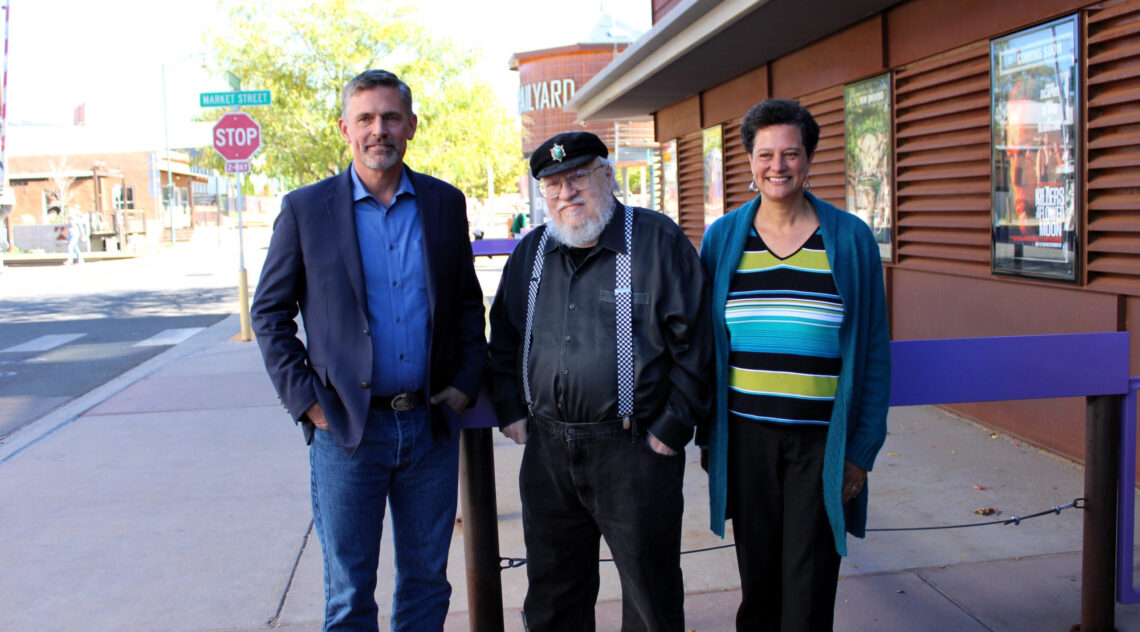
Artificial intelligence is a topic important to many people in the creative fields since artists’ and writers’ works can be used without their permission.
How AI affects the creative economy was the subject of a panel discussion by U.S. Senator Martin Heinrich, author George R.R. Martin and University of New Mexico Computer Sciences Department professor Melanie Moses. Julia Goldberg of the Santa Fe Reporter moderated the panel Friday at the Violet Crown movie theater in Santa Fe.
“I think the biggest threat would be if we allow artificial intelligence to become a tool that supplants artists, rather than a tool that is used by creative artists,” Heinrich, who is the founding co-chair of the Artificial Intelligence Caucus, said.
AI’s influence on the financially minded employers of artists was a worry for Martin.
“I think that’s certainly one of the concerns is if AI is drawing pictures and writing books and those things are issued by the big corporations and they don’t need to employ writers or artists or actors anymore. That’s the danger here,” author George R.R. Martin said.
Martin is one of the 17 signatories in the Author’s Guild’s class action lawsuit against OpenAI that was filed in September. The lawsuit claims OpenAI’s “flagrant and harmful infringements on the plaintiff’s registered copyrights.”
The case is expected to have a pretrial conference Nov. 29.
Moses, who works on AI at UNM shared the same fear that Heinrich and Martin had about the loss of human creative endeavors to AI.
“I think it’s particularly interesting that creatives are the jobs that are most obviously threatened right now,” Moses said. “I think the real threat is that not only are people immediately their livelihood is threatened… you are threatened with losing the creative contributions of humanity.”
Moses said to think of the creative industry, artists, writers and the like, as the “tip of the spear” since these are a type of skilled labor that needs the human touch to work.
“Like maybe AI will replace the factory worker and so we’ll just retrain you to do another job,” Moses said.
Heinrich has worked on regulations for AI so as to prevent the explosive proliferation that happened with social media from happening with AI.
“From a policy point of view, we have a window right now, a window that we lost with social media when it came on the scene,” Heinrich said. “Government did not get ahead of social media and now it’s really hard to do anything about that. So right now, for the most part, a lot of the policy proposals that you’re seeing around artificial intelligence, are bipartisan, and they have not, you know, people have not retreated to their partisan corners…now is the moment we need to move quickly.”
Heinrich was part of an AI forum earlier this year which hoped to begin conversations between policymakers and the technological sector.
“I think that, you know, for example, you shouldn’t, in my view, be able to train a model on copyrighted material or protected intellectual property without the consent of whoever owns that intellectual property,” Heinrich said.
Aside from AI’s effects on the creative sector, there is also the question of AI’s uses in physical objects like cars or a power grid. Martin said that these things need to be tested and certified because these are “things that are gonna impact whether people live or die.”
Panelists also discussed AI racial bias that favors white people.
Moses read of an experiment where a generative AI program was asked to produce pictures of African doctors treating white patients. The results were everything but an African doctor treating a white patient. So, she tried the experiment herself.
“And I too, could not get the AI to generate the image that was asked for,” Moses said. “I could get Black doctors treating white rabbits, Black doctors treating white all kinds of other objects, but never white patients. It would refuse to generate those images. So that’s an example of the kind of depth of bias that’s baked into these algorithms.”
The concentrated corporate power over AI is important, Moses said,
“This is powerful technology, and having a few large companies that have the ability to build these neural networks and train them with, you know, enormous amounts of computation, that requires enormous amounts of power and water to make these work,” Moses said. “I think that we want to figure out ways to democratize the use of this technology.”
The current dangers of AI lie in the misinformation and scams and how these make the average consumer not know what to trust “and I don’t know how we regulate ourselves out of that,” Moses said.